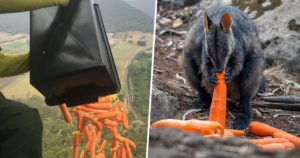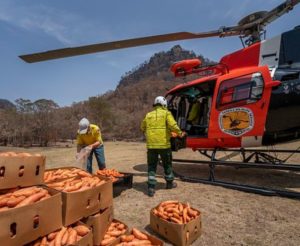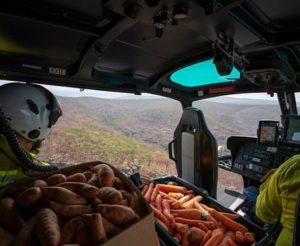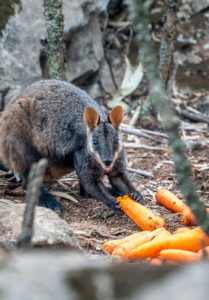 Planes Drop Thousands Of Kilograms Of Carrots And Potatoes For Starving Animals
Planes Drop Thousands Of Kilograms Of Carrots And Potatoes For Starving Animals
Emma Rosemurgey, Unilad, Jan. 12, 2019
Aircraft are being used to drop thousands of kilograms of carrots and sweet potato to hungry wildlife stranded amid the Australian bushfire crisis.
The New South Wales government commissioned the service titled ‘Operation Rock Wallaby’ which aims to feed the state’s colonies of brush-tailed rock wallabies and help the state’s population of marsupials survive.
A week ago the New South Wales National Parks and Wildlife Service began its mission undertaking the food drops in the Capertree and Wolgan valleys, Yengo National Park, the Kangeroo Valley, and around Jenolan, Oxley Wild Rivers and Currancubundi national parks.
You can take a look at the food drops below:
So far, they have dropped more than 2,200kg of fresh vegetables for animals living below.
Matt Kean, environment minister for New South Wales, said although the animals have successfully managed to flee the fires, they’re now outside of their natural habitat and are therefore left without food.

As per MailOnline, he said:
The wallabies typically survive the fire itself, but are then left stranded with limited natural food as the fire takes out the vegetation around their rocky habitat.
The wallabies were already under stress from the ongoing drought, making survival challenging for the wallabies without assistance.
Kean went on to say they will be keeping an eye on the rock wallabies to check on their progress as part of the post-bushfire recovery process.

He said:
When we can, we are also setting up cameras to monitor the uptake of the food and the number and variety of animals there.
The heartwarming initiative comes after the World Wildlife Fund estimated around 1.25 billion animals have died, either directly or indirectly from the bushfires.
In a statement, WWF Australia CEO Dermot O’Gorman said:
This heart-breaking loss includes thousands of precious koalas on the mid-north coast of NSW, along with other iconic species such as kangaroos, wallabies, gliders, potoroos, cockatoos and honeyeaters.
The rock wallaby was already considered an ‘at risk’ species before the bushfires as a result of habitat destruction.
Meanwhile, Animals Australia has been hard at work using aircraft to transport food supplies for wildlife that are burnt and injured from the fires in Victoria.

The charity has been using donations from the public to lease small planes, which they’ve filled with bags of grain and pellets to give out to wildlife in the region through ‘Vets for Compassion’.
Animals Australia spokeswoman Lyn White said they’re trying to ensure the surviving wildlife doesn’t die from lack of food.
She said:
With roads likely shut for weeks, the risk of starvation for surviving wildlife in the area is very real.
It would be tragic if there was a further loss of life because the needs of surviving animals was not being met.
You can donate to Animals Australia here.

